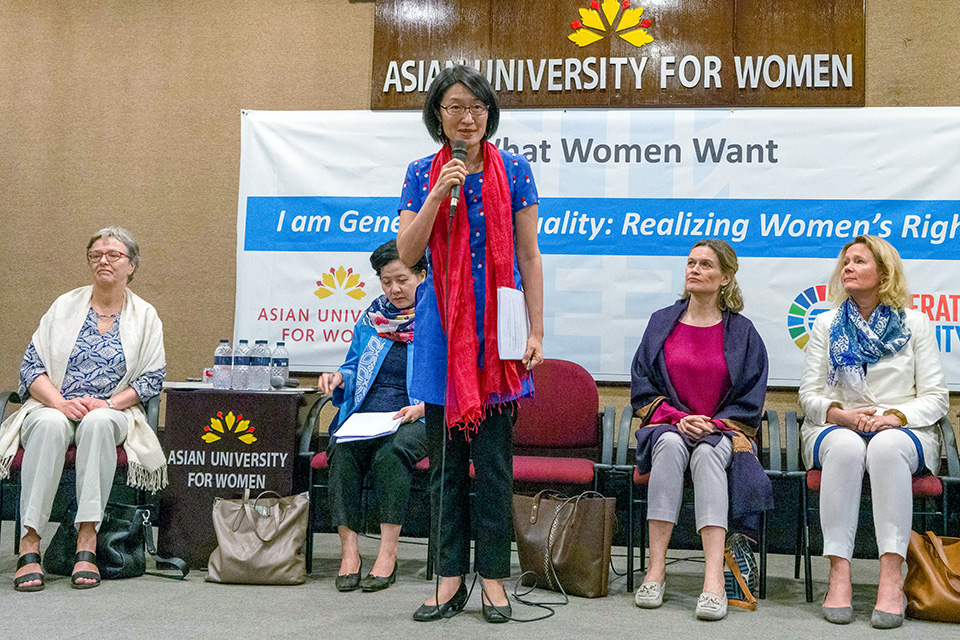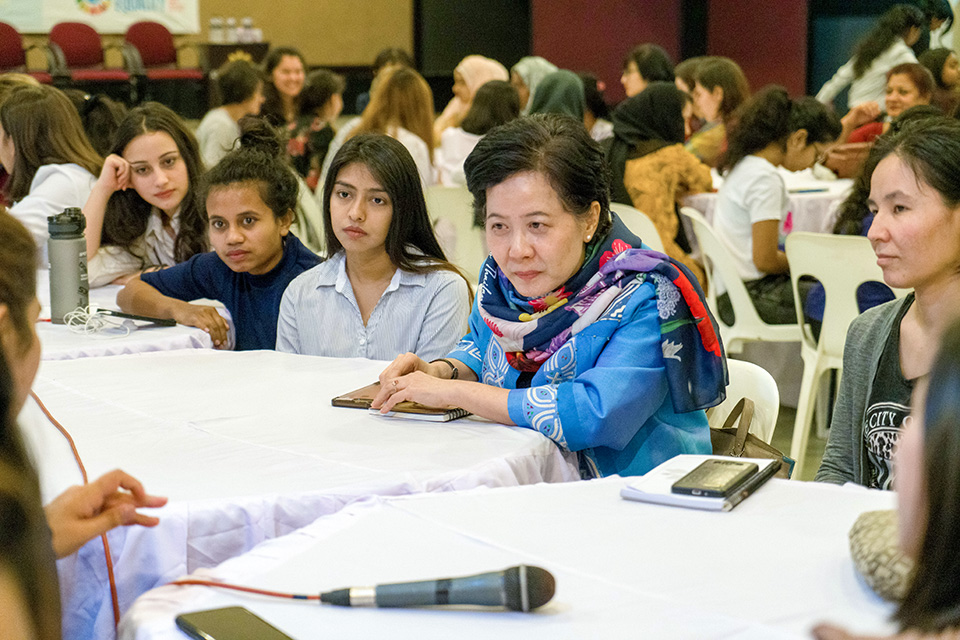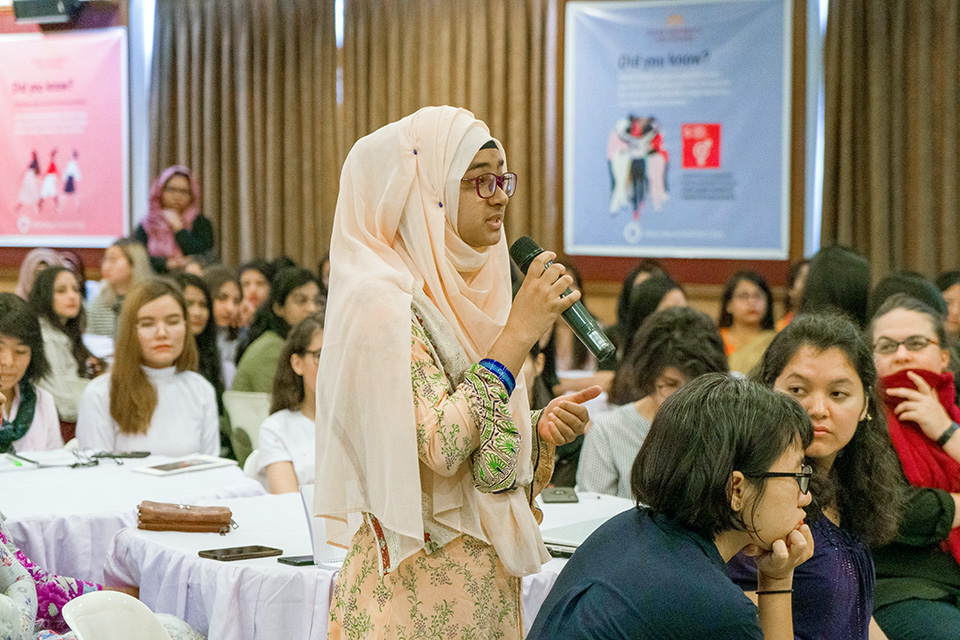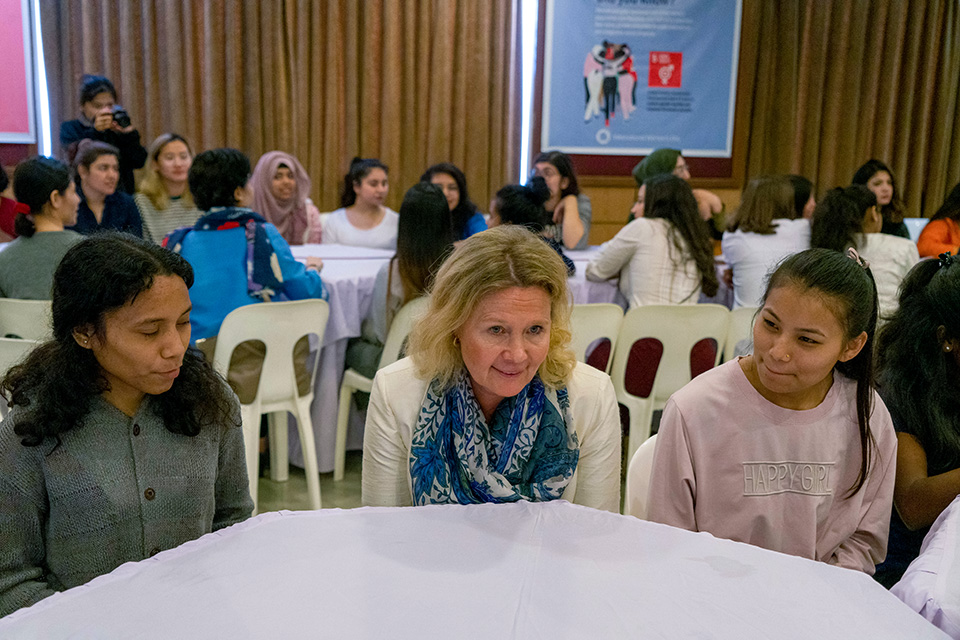Break the glass ceiling, a UN Women-organized delegation tells students in Bangladesh
Date:
Author: Syeda Samara Mortada

Chittagong, Bangladesh — In a dialogue arranged by UN Women to celebrate International Women’s Day, six senior female diplomats and United Nations officials inspired students of Asian University for Women to try to overcome gender discrimination in society and achieve their life goals.
The intergenerational dialogue on March 4 was part of UN Women’s campaign for Generation Equality.
Asian University for Women aims to produce female leaders who will not only be skilled professionals, but also service-oriented members of their communities and businesses. A unique university programme called Pathways for Promise identifies and educates talented women from underserved communities such as daughters of microfinance borrowers; historically neglected ethnic minorities; ready-made garment factory workers; tea estate workers; refugees and internally displaced persons; and women of lower socioeconomic status. As of 2018, more than 70 women from Rohingya communities in Bangladesh and Myanmar have enrolled at the university to pursue bachelor’s degrees.

The female leaders that joined the March 4 event were Arunrung Phothong Humphreys, Ambassador of Thailand to Bangladesh; Sidsel Bleken, Ambassador of Norway; Charlotta Schlyter, Ambassador of Sweden; Shoko Ishikawa, Country Representative, UN Women Bangladesh; Asa Torkelsson, Representative, United Nations Population Fund (UNFPA) Bangladesh; and Sun Lei, Head of Education and Education Programme Specialist, United Nations Educational, Scientific and Cultural Organization (UNESCO) Bangladesh.
They held a panel discussion on Breaking the Glass Ceiling and on Feminism from West to East, moderated by the UN Women Country Representative. Then, some of the more than 200 students who attended the event asked them questions including how the students can help to end domestic violence and whether feminism deals with topics such as promoting acceptance of all body types and of LGBTIQ people.
Humphreys said that Thailand’s cultural practice of respecting elders encourages sensitivity toward all members of society such that gender in itself is not an issue.
However, she said, women fill only 23 per cent of the decision-making posts in Thailand’s Ministry of Foreign Affairs even though women outnumber men in the Ministry.

Humphreys encouraged the students to believe in themselves. “You have to get out of your comfort zones to become agents of change,” the Ambassador said.
When a student asked if breaking the glass ceiling is as big an issue in the United Nations system as it is in the private sector, Torkelsson said that throughout her career, she felt that she had to repeat herself again and again in order to be heard.
She said: “Leadership is also about overcoming your fears. You will need courage to overcome these fears and all of you have huge amount of courage. We are inspired by you. You can do more by being a leader.”
Schlyter said working on gender equality is a managerial responsibility, although at the end of the day, everyone is accountable. She said women make up half the staff at the Swedish Embassy in Bangladesh. Sweden’s “feminist” foreign policy promotes gender equality, she said.

Bleken said women need support from both their families and work supervisors to progress in their careers.
However, during a conversation on how young people should speak up on gender equality, one student said that too much pressure was being put on young people and not enough attention was being given to convincing parents and other elders. Gender equality is being discussed on campus and with friends, but not at home, she said.
“Why is there so much expectation from us?” the student said. “Why is there not more work being done to raise awareness of our guardians on gender-related issues?”
Schlyter urged the students to go to the front row instead of staying in the back.
“Watch the dynamics in the room for a seat at the table,” she said. “Take opportunities to speak, volunteer. Recognize gender stereotypes and don’t accept them. Politely state you are equal to men.”